Hero 2004
 for stylized martial arts violence and a scene of sensuality.
for stylized martial arts violence and a scene of sensuality.
Reviewed by: Chris Monroe
STAFF WRITER
| Moral Rating: | Average |
| Moviemaking Quality: |
|
| Primary Audience: | Teens Adults |
| Genre: | Action Adventure Martial-Arts |
| Length: | 1 hr. 36 min. |
| Year of Release: | 2002 |
| USA Release: |
August 27, 2004 |
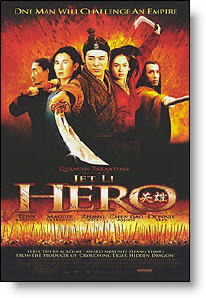
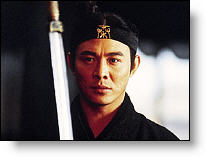
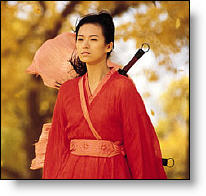
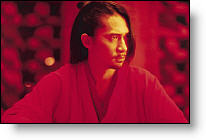
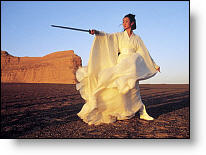
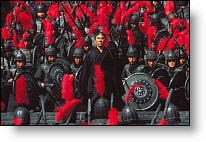

Why I stopped following Buddha and started following Jesus Christ? Answer
Ten Questions I’d Ask If I Could Interview Siddhartha Gautama (Buddha) Today—GO
What is Monism and Pantheistic Monism? Answer
Who believes in Monism? Is it biblical?
Personal story: Jesus Christ 2, Buddha 0
Can mysticism lead to God? Answer
| Featuring |
|---|
| Jet Li, Ziyi Zhang, Tony Leung Chiu-Wai, Donnie Yen, Maggie Cheung |
| Director |
|
Zhang Yimou |
| Producer |
| Zhang Yimou, Bill Kong |
| Distributor |
Most people respect and revere someone who acts bravely and does nobly, but how do they respond if the one they admire doesn’t appear to be a winner or a champion? Comprised of several valiant main characters, “Hero” retells a myth of how a small band of people worked and sacrificed to help unite the land we know today as China. Even though they may look like failures, the personal price they pay to lose becomes a victory for everyone else.
A Chinese prefect modestly referred to as “Nameless” (Jet Li) is brought before the King based on the report that he has killed the King’s three most powerful enemies: Sky (Donnie Yen), Broken Sword (Tony Leung), and Flying Snow (Maggie Cheung). Coming to receive his reward, Nameless is kept at a secure distance from the King and required to report his achievements. Through repeated flashbacks and various revisions of the past, Nameless and the King each present what they believe actually happened until the truth finally prevails. But their final consensus is just the beginning of an unavoidable confrontation.
The reasonable expectation for a martial arts film like this is that it will be filled with violence. There is an array of sword fighting, arrow shooting, stabbing and death, but it is interesting to note that the violence isn’t a typical assault of the senses. With all of the violent encounters, there is only one instance where we see actual blood shed. There are a few moments where we see someone stabbed, but the moments are brief, and the focus is on the person’s reaction. Considering the background and the culture of these kinds of films, the work is done to appreciate the artistry in how the fighting is done. Where Tarantino uses fighting for violence to be made cool, director Zhang Yimou employs fighting to display something graceful and poetic.
None of the violence is unnecessarily gratuitous or disturbing, and the reason for the fighting is always clear and purposeful. Aside from that, there is no foul language, but there is a brief instance where Jet Li is shown nude from the backside. Also, one short scene depicts two characters in bed together under a sheet. While there is no nudity, some of the sounds while they are together are explicit. Overall, these objectionable moments are very few and far between.
The craftsmanship of the filmmaking is exceptional, and may hearken one back to Ang Lee’s film “Crouching Tiger, Hidden Dragon” (but with less violence). Each flashback is presented with a different color (red, green, blue, and white), which enhances much of the visual entertainment of the film, but also depicts the various themes of the flashbacks. The production design and art direction are outstanding, and while the computer graphics are a little too much at times, the cinematography is still excellent.
The most evocative moment I experienced was one (of several) of the fights between Broken Sword and Flying Snow. Although Broken Sword has sworn to avenge the death of Flying Snow’s father (out of his love for her), he has realized that the best thing he can do is to lay down his sword and not fight. Not understanding why Broken Sword will not take revenge, Flying Snow fights Broken Sword and kills him. Stunned, she asks why he didn’t defend himself, to which he replies, “So you would believe me.” With his death, Snow is broken, and ends up dying with him.
Because Broken Sword and Flying Snow are lovers, there is a metaphor that can be extracted from this scenario of our relationship with Jesus Christ. It wasn’t until Broken Sword dies that Flying Snow finally understands—and believes—what he has been telling her. It’s at that point that she identifies herself with him and dies, too. She dies to her own way of thinking and stubbornness of how she wants things to be. So, too, Christ Jesus has died for us, sacrificing Himself so that we can believe Him and turn from our stubborn ways. When we repent like this (as Flying Snow does), we are dying to ourselves and identifying ourselves with Christ and His death.
But the Gospel doesn’t stop at Christ’s death. There is hope when we turn to Jesus Christ like this. Romans 6:5-8 (NAS) encourages us: For if we have become united with Him in the likeness of His death, certainly we shall be also in the likeness of His resurrection, knowing this, that our old self was crucified with Him, that our body of sin might be done away with, that we should no longer be slaves to sin; for he who has died is freed from sin. Now if we have died with Christ, we believe that we shall also live with Him. That is good news.
This is one of several aspects that can be highly appreciated in this film. It is highly entertaining and rich in beauty and meaning. There is too much good in it for a production like this to be ignored.
Violence: Moderate / Profanity: None / Sex/Nudity: Mild


[Better than Average/3½]
[Good/1½]
[Better than Average/5]
As you no doubt have already read about the plot, character motivations, etc from other reviews, I will add my two cents about the pictures overall entertainment value. First off I would like to say that I loved this movie! I enjoyed “Crouching Tiger, Hidden Dragon” as well. If you did not care for that movie then you probably won’t like this one. I thing “CTHD” was probably a better produced movie in some terms, only due to the fact that you can clearly see the “animated” arrows used in numerous parts of “HERO.” This movie was just beautifully shot. You had to follow the plot closely, and of course some scenes were only figments of the storytellers imaginations. The use of different colors to represent how the characters were displayed for those scenes was excellent. (Red outfits for the assassins when the story was told that they were enemies of Jet Li—Blue outfits when the story was re-told by the King to symbolize that the assassins were friends with Jet Li. White outfits, green outfits, etc.) In one scene when one of the assassins die the yellow leaves all turn red to represent death.
The only offensive part of the movie was the part when one of the assassins took his servant girl—well you don’t see anything as they are under a huge satin/silk curtain, but you do hear the girl in the throws of passion. This part of the story actually never really happened, since it was a part of the Hero’s tale/lie to explain why two assassins fought each other (jealousy). My final thought on the movie is that the ultimate message of the movie can really demonstrate some Christian principals (ie: Lay down your life, Die for a cause, Put away the sword, etc.)
[Better than Average/4½]
[Average/3]
[Good/4½]
Editor’s Note: Read…
Why I stopped following Buddha and started following Jesus Christ? Answer
Ten Questions I’d Ask If I Could Interview Siddhartha Gautama (Buddha) Today—GO
What is Monism and Pantheistic Monism? Who believes in Monism? Is it biblical? Answer
Personal story: Jesus Christ 2, Buddha 0
Can mysticism lead to God? Answer
[Good/4]
[Excellent!/5]
[Better than Average/4½]

My Ratings: [Better than Average/5]